
TOXICOLOGY
Scope & Guideline
Advancing toxicological insights for a safer tomorrow.
Introduction
Aims and Scopes
- Ecotoxicology and Environmental Toxicology:
Research on the effects of pollutants such as heavy metals, pesticides, and pharmaceuticals on aquatic and terrestrial organisms, including studies on bioaccumulation, biomagnification, and ecological risk assessments. - Mechanisms of Toxicity:
Investigations into the biochemical and physiological mechanisms through which toxic substances affect organisms, including studies on oxidative stress, hormonal disruption, and genetic damage. - Toxicological Assessment and Risk Evaluation:
Development and application of methodologies for assessing the toxicity of chemicals, including single and combined exposures, chronic and acute toxicity tests, and modeling of ecological impacts. - Biomarkers and Bioindicators:
Utilization of various biological indicators to assess the health of ecosystems and the impact of contaminants, including studies on gene expression, enzyme activity, and physiological responses. - Nanotoxicology:
Research focused on the toxicity of nanoparticles and their interactions with biological systems, including studies on environmental persistence and impacts on microbial and animal health. - Phytotoxicity and Soil Toxicology:
Studies examining the effects of contaminants on plant growth and soil health, including the impact of agricultural chemicals on soil microbial communities and plant physiology.
Trending and Emerging
- Microplastics and Their Ecotoxicological Effects:
An increasing number of studies are focusing on the impacts of microplastics on aquatic and terrestrial organisms, highlighting the urgent need to understand their environmental fate and biological effects. - Pharmaceuticals and Personal Care Products (PPCPs):
Research into the ecotoxicological impacts of pharmaceuticals and their mixtures is on the rise, driven by concerns over their presence in water bodies and effects on non-target organisms. - Combined Chemical Exposures and Mixtures:
There is a growing emphasis on studying the combined effects of multiple chemicals, reflecting real-world exposure scenarios more accurately and addressing the complexity of environmental toxicity. - Endocrine Disruption and Hormonal Toxicology:
An emerging focus on the effects of endocrine-disrupting chemicals (EDCs) and their mechanisms of action is evident, emphasizing the need for understanding how these substances affect reproductive and developmental health. - Climate Change and Toxicology:
Research exploring the interactions between climate change factors (such as temperature and salinity) and chemical toxicity is gaining traction, indicating a holistic approach to understanding ecological impacts.
Declining or Waning
- Traditional Chemical Toxicology:
Research specifically focused on the toxicity of traditional chemicals (e.g., organophosphates) appears to be declining, possibly due to a shift towards investigating mixtures and real-world exposure scenarios. - Aquatic Toxicity of Legacy Pollutants:
There seems to be a waning interest in studies solely focused on the aquatic toxicity of legacy pollutants, such as PCBs and PAHs, as newer contaminants of emerging concern gain more attention. - Laboratory-Based Toxicity Testing:
A decrease in emphasis on standard laboratory toxicity testing methods may be noted, as the field moves towards more ecologically relevant assessments that consider environmental complexities. - Biodiversity Studies in Toxicology:
Research explicitly linking biodiversity metrics to toxicological outcomes appears less frequent, possibly overshadowed by more direct assessments of chemical impacts on specific species or ecosystems.
Similar Journals

TOXICOLOGY AND APPLIED PHARMACOLOGY
Pioneering Research in Toxicological ScienceTOXICOLOGY AND APPLIED PHARMACOLOGY, published by Academic Press, Inc. Elsevier Science, stands as a leading journal in the domains of toxicology and pharmacology, with its establishment dating back to 1959. With an impact factor reflecting its academic rigor and relevance, this journal is classified in the Q2 quartile for both pharmacology and toxicology categories, underscoring its significance in the scientific community. It ranks #34 out of 133 in Toxicology and #95 out of 313 in Pharmacology according to Scopus, placing it within the 74th and 69th percentiles, respectively. The journal aims to disseminate quality research that drives advancements in understanding the interactions of drugs and toxic substances within biological systems. Researchers and professionals are invited to contribute and engage with a broad spectrum of articles that cover mechanistic studies, risk assessment, and innovative therapeutic strategies. Although the journal does not offer open access, it continues to be a crucial resource for those who seek to navigate the complex interface of drugs and their toxicological implications.
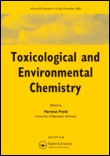
TOXICOLOGICAL AND ENVIRONMENTAL CHEMISTRY
Championing interdisciplinary dialogue for environmental health.TOXICOLOGICAL AND ENVIRONMENTAL CHEMISTRY is a pivotal journal published by Taylor & Francis Ltd, addressing critical intersections between environmental chemistry and toxicology since its inception in 1979. With its ISSN 0277-2248 and E-ISSN 1029-0486, the journal serves as a platform for rigorous research and innovative methodologies in pollution control, health implications of environmental chemicals, and the broader spectrum of toxicological studies. Although it currently does not offer open access, the journal's impact in the field is underscored by its Category Quartiles rankings in 2023, placing it in Q3 across Environmental Chemistry, Health, Toxicology and Mutagenesis, and Pollution categories. Furthermore, its Scopus rankings reveal its significant role within the scientific community, specifically in areas such as Environmental Science and Toxicology. The journal aspires to foster multidisciplinary dialogue and advance knowledge that contributes to environmental sustainability and public health, making it an essential resource for researchers, professionals, and students dedicated to these fields.
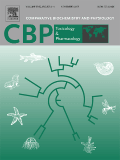
COMPARATIVE BIOCHEMISTRY AND PHYSIOLOGY C-TOXICOLOGY & PHARMACOLOGY
Exploring the Intersections of Biochemistry and PhysiologyComparative Biochemistry and Physiology C-Toxicology & Pharmacology, published by Elsevier Science Inc, stands as a prominent resource in the fields of pharmacology, toxicology, and biochemical research. With its ISSN 1532-0456 and E-ISSN 1878-1659, this journal has carved out a significant niche, focusing on the comparative aspects of biochemical and physiological data across various species. Recognized for its impact in diverse fields, it boasts a Q1 ranking in Animal Science and Zoology, Aquatic Science, Health, Toxicology and Mutagenesis, alongside respectable standings in other related disciplines. Researchers and professionals can leverage this publication to access high-quality, peer-reviewed studies that advance the understanding of biochemical processes and their toxicological implications. The journal aims to bridge the gap between laboratory findings and real-world applications, fostering an environment for interdisciplinary collaboration. For academics seeking to enhance their knowledge or contribute to this impactful field, Comparative Biochemistry and Physiology C-Toxicology & Pharmacology serves as an invaluable platform.

Toxicology and Environmental Health Sciences
Connecting Toxicology Insights with Public Health StrategiesToxicology and Environmental Health Sciences is a peer-reviewed journal published by the Korean Society for Environmental Risk Assessment & Health Science, dedicated to advancing the fields of toxicology and environmental health. With an ISSN of 2005-9752 and E-ISSN 2233-7784, this journal serves as a vital platform for researchers, professionals, and students seeking to explore the intricate relationships between environmental risks and public health. Operating from South Korea, it has a converged years span from 2009 to 2024, and currently holds a respectable Q3 quartile ranking in both Health, Toxicology and Mutagenesis and Toxicology. This positions the journal within a critical space for those invested in understanding and mitigating environmental health challenges. Although not an open-access journal, it continues to foster high-impact research, contributing to a better understanding of toxicological sciences and environmental health dynamics. Engage with the latest findings and discussions that shape this evolving field through the insightful articles published herein, reinforcing its importance as a resource for scholars and practitioners alike.
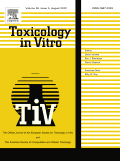
TOXICOLOGY IN VITRO
Empowering Researchers with In Vitro Toxicology AdvancesTOXICOLOGY IN VITRO is a premier journal published by PERGAMON-ELSEVIER SCIENCE LTD, focusing on the latest advancements in the field of toxicology, particularly through in vitro methodologies. With an ISSN of 0887-2333 and an E-ISSN of 1879-3177, this journal serves as a critical platform for researchers aiming to disseminate their findings in toxicology, emphasizing innovative approaches and applications in pharmacology and toxicology. Featuring a commendable impact factor and classified in the second quartile (Q2) for both Medicine (miscellaneous) and Toxicology in 2023, the journal holds a significant position within the academic community, ranking 41st out of 133 in the Toxicology category according to Scopus, representing the 69th percentile. Despite being a subscription-based publication, it continuously attracts submissions from leading scientists worldwide, fostering a vibrant exchange of scientific knowledge. Since its inception in 1987, TOXICOLOGY IN VITRO has consistently aimed to enhance understanding of toxicological challenges, making it an invaluable resource for professionals, students, and researchers dedicated to developing safer pharmaceuticals and understanding the biological pathways influenced by potential toxic agents.
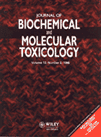
JOURNAL OF BIOCHEMICAL AND MOLECULAR TOXICOLOGY
Pioneering Research in Biochemical InteractionsJournal of Biochemical and Molecular Toxicology, published by Wiley, plays a pivotal role in the advancement of knowledge within the fields of biochemistry, toxicology, and molecular biology. Established in 1998, this esteemed journal has garnered a significant reputation, evidenced by its current placement in the Q2 quartile across several categories, including Biochemistry, Health, Toxicology and Mutagenesis, and Medicine. With an ISSN of 1095-6670 and an E-ISSN of 1099-0461, it serves an international audience, offering critical insights and innovative research that shape our understanding of biochemical interactions and toxicological assessments. While it does not operate on an open-access model, the journal ensures rigorous peer review and high-quality publication standards, making it a valuable resource for researchers, professionals, and students dedicated to the exploration of molecular toxicology. The journal's recognized impact within the scientific community is reflected in its competitive rankings among specialized journals, fostering significant contributions to both academic and applied contexts.

Current Research in Toxicology
Pioneering Insights in Toxicology ResearchCurrent Research in Toxicology is a pioneering journal published by ELSEVIER that serves as a vital platform for disseminating cutting-edge research in the field of toxicology, spanning from biological impacts to pharmacological applications. With an ISSN of 2666-027X and an impressive Q2 ranking in key categories such as Applied Microbiology and Biotechnology, Health, Toxicology and Mutagenesis, and Toxicology, this journal underscores its commitment to high-quality research and significant contributions to the scientific community. Based in the Netherlands, Current Research in Toxicology aims to bridge the gap between academia and industry by providing rigorously peer-reviewed articles that cover a wide array of topics including novel methodologies, regulatory challenges, and emerging trends within the domain. The journal is accessible through various platforms, making it essential for researchers, professionals, and students eager to stay updated on the latest findings and advancements in toxicology. With a comprehensive focus on integrating theory with practical application, this journal is poised to influence future studies and policies in health and environmental science.
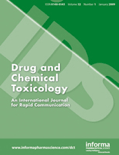
DRUG AND CHEMICAL TOXICOLOGY
Empowering public health through toxicology research.Drug and Chemical Toxicology is a well-respected journal in the fields of toxicology, pharmacology, and public health, published by Taylor & Francis Ltd. Since its inception in 1978, this journal has diligently explored the effects and mechanisms of chemical exposures on health and the environment, fulfilling a crucial role in advancing scientific understanding and safeguarding public health. The journal is indexed across prestigious databases and features an impressive array of articles categorized within the Q2 and Q3 quartiles across various categories in 2023, reflecting its significance in Chemical Health and Safety as well as Environmental and Occupational Health disciplines. With an extensive reach and a focus on interdisciplinary research, Drug and Chemical Toxicology offers a rich repository of original research, reviews, and methodological advancements, catering to a diverse audience of researchers, professionals, and students dedicated to the betterment of safety and health standards. Although not an open-access publication, its articles are widely accessible to the academic community, ensuring that critical innovations and insights are shared for the greater good.
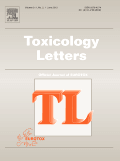
TOXICOLOGY LETTERS
Connecting research and practice for a healthier world.TOXICOLOGY LETTERS is a prominent journal dedicated to advancing the field of toxicology, providing a platform for high-quality research and reviews that explore the effects of chemical substances on biological systems. Published by Elsevier Ireland Ltd, this peer-reviewed journal has established itself as a vital resource in toxicological research since its inception in 1977, with a convergence of studies extending to 2024. With an impressive Scopus ranking, positioned at #28 out of 133 in the Toxicology category, TOXICOLOGY LETTERS garners a respectable percentile of 79, highlighting its significance in the academic community. Although it is not an open-access journal, its research is accessible through institutional subscriptions, ensuring that critical insights into human health and environmental safety are disseminated effectively. Being categorized in the Q2 quartile in both Medicine (miscellaneous) and Toxicology for 2023 further emphasizes its relevance and impact in these fields. This journal aims to foster collaboration between researchers and professionals, encouraging the exploration of innovative solutions to chemical hazards and the promotion of safer practices in pharmacology and toxicology.

Molecular & Cellular Toxicology
Pioneering research at the crossroads of toxicology and pharmacology.Molecular & Cellular Toxicology, published by the Korean Society Toxicogenomics & Toxicoproteomics (KSTT), is a significant journal in the field of toxicology, providing crucial insights into molecular mechanisms underlying toxic responses. With an ISSN of 1738-642X and E-ISSN 2092-8467, this journal serves as a vital platform for researchers, professionals, and students interested in the latest findings and advancements in toxicology, health, and environmental science. Although it operates under a subscription model, it maintains rigorous peer review standards, contributing to its respectable Q3 classification in Health, Toxicology and Mutagenesis, and its Q2 standing in Pharmacology, Toxicology, and Pharmaceutics. The journal, intersecting with innovative aspects of pharmacology and public health, aims to foster a deeper understanding of toxicological impacts on cellular processes and overall health. Located in Germany and supported by a dedicated editorial board, Molecular & Cellular Toxicology stands out in the academic community, encouraging interdisciplinary discourse and collaboration to address critical toxicological challenges. Engage with us for cutting-edge research that informs and shapes the future of toxicological science.